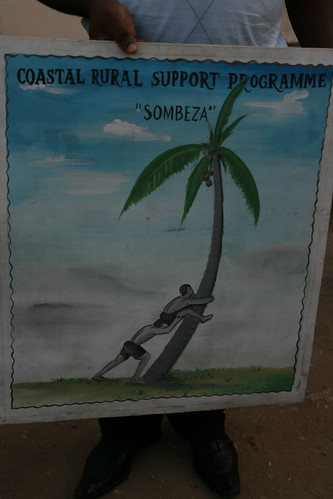In Kenya, a similar campaign is underway. It's a constant struggle to educate children about the proper hand washing techniques as well as when one should scrub: before meals, after using the washroom, etc. This is especially true for the rural regions of Mombasa, where a water sanitation & hand washing awareness project was implemented.
One of the problems in this situation is the lack of education at home. Parents and other family members don't understand the need for proper hand washing to reduce the spread of disease. Obviously, when your water is scarce and its source is far, washing your hands is the last thing on your mind. It's more important to use water to cook, drink, and of course, feed the animals and water the plants... it's a priority thing. You can't lose your sole source of income to drought.
But drought or no drought, the Coastal Rural Support Programme, funded by the Aga Khan Development Network and run by the Aga Khan Foundation Kenya, strives to educate the children, because that's their way in to the rest of the family. Informal local studies have shown that the kids actually bring home the things they learn at school and tell their parents what's important and why. They get used to a certain standard of living and want to improve their lifestyle at home as well. This applies to prevention as much as to other tough issues, health-related or not.
As the CRSP(K) representatives informed us, the number 1 priority in rural communities is always water. When they visit different villages, the first request they get is water related. However, CRSP is not a service provider. It's a facilitator. Its motto is "Sombeza", which means "boost". This is their goal: Help people help themselves. This is a key principle of AKDN as well.

Fortunately, this programme doesn't require too many resources. In terms of human resources, CRSP is able to train administrators and teachers in the rural schools so that they can take charge of the local initiative and monitor it effectively. The project is sustainable, as most schools have some source of water, whether it's natural or purchased. In order to keep it low cost and effective, schools hang up tubs containing still water off trees in key areas: in the school yard where children eat and right in front of the outdoor bathrooms.

Keep in mind, these are regions where bathrooms consist of latrines, some of which no longer have doors. The school we visited benefited from another CRSP project that saw them build 3 additional so-called VIP latrines per gender, which are wider and have blocks on either side of the hole for easier squatting. This doubled the school's capacity: now boys and girls each have 6 stalls in which they can do their dirty business.
Here's a little perspective: there are 1300 students at this school.
Assuming a 50-50 gender split, that means 650 students for 6 latrines, or 108 people per latrine. Taking into account multiple uses per day and villagers that might wander down to use the facilities, that's a big boost!
*Old latrine*

The waste from these latrines is contained in a landfill a few steps away and covered with old tin roofs, so there's obviously still a lot of work to be done in terms of proper hygiene and sanitation. And yes, it stinks!
With this school water sanitation project, CRSP has a community-wide impact. Because of the children's persistence in bringing the information they learn at school to their homes, the whole family gains a better understanding of the factors at play. According to the nurses at the regional dispensary, which is conveniently located just across the street, there has been a 50% reduction in water-born illnesses since the water sanitation project was implemented.
This is a battle that is far from over, but washing your hands is a good place to start.
So as we tell our kids in North America to "scrub for 30 seconds and don't forget between your fingers", let's also remember the African children, learning the same lessons, even though they are hundreds of thousands of miles away and living in a different reality.
These are good hygiene principles to have no matter where you live, and it's a shame we don't practice what we preach.
For now, lather, scrub and... stay tuned!





No comments:
Post a Comment